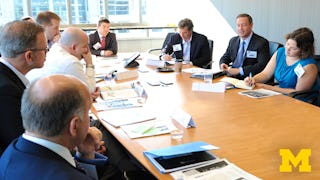In this course, you’ll gain the essential tools and frameworks to step confidently into a leadership role, whether you were promoted last week or are preparing for your first team. Built around the People → Process → Performance framework, this fast-paced, practical course helps you build trust, drive execution, and coach for growth—all in under an hour.
You’ll learn how to foster psychological safety, shift from individual contributor to team leader, and implement trust-building strategies like a 30-60-90 onboarding plan. You’ll also design lean systems using OKRs, meeting cadences, and decision-rights models to create clarity and momentum without micromanagement. Finally, you’ll develop the skills to diagnose performance issues, deliver motivating feedback using the DESBO model, and ignite progress with targeted 30-day improvement experiments. This course is designed for newly promoted managers and team leads—especially those working in tech, product, or cross-functional project environments—who need a fast, practical ramp-up into leadership. It's equally valuable for individual contributors on the cusp of their first supervisory role, helping them avoid common early pitfalls. HR and L&D professionals building manager-onboarding programs will find actionable frameworks, while startup founders and small-business owners will gain lightweight, scalable systems for team leadership. Even experienced managers can benefit from a concise refresh on trust-building, delegation, and performance coaching. There are no formal prerequisites for this course—any motivated learner can enroll. However, the course is most impactful for those currently working with a team, project group, or peer circle where they can immediately apply the tools and techniques. Learners with upcoming team responsibilities will also benefit from the opportunity to prepare and practice foundational leadership strategies in real-world contexts. By the end of this course, learners will be able to create psychologically safe team environments that encourage trust, inclusion, and open communication. They will implement practical systems like OKRs, meeting rhythms, and delegation frameworks to drive focus and execution. Learners will also develop diagnostic skills to address performance challenges using models like the Skill-Will matrix and conduct effective feedback conversations. Finally, they will learn how to sustain motivation through meaningful recognition and a culture of continuous improvement.


















